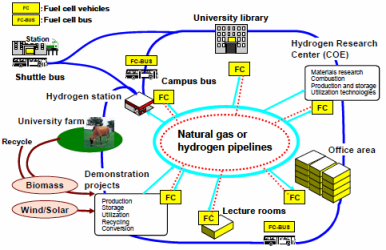|
| |
|
|
University Summit in Kyushu 2007
Kyushu University, Fukuoka,
Japan, 27-28 October
Session 1(Part1): The "Science City" of the Future and the Environment
Prof. Dr. Kazunari SASAKI
Faculty of Engineering, Kyushu University |
|
Kyushu University Hydrogen Project:
A challenge for reliable clean energy technologies
|
| |
Hydrogen-based energy technologies using fuel cells are promising environmentally- compatible technologies for this century. In Japan, fuel cell vehicles have been pre-commercialized since 2002, and thousands of fuel cell co-generation systems are now been demonstrated in various locations. For their commercialization, however, various scientific as well as engineering problems should be solved. Fundamentals on materials and system engineering in hydrogen-related technologies should be established to ensure the safety and reliability of energy systems for hydrogen production, storage, utilization, as well as their integration technologies
As one of the 21st Century COE (Center-of-Excellence) Programs, gIntegration Technology of Mechanical Systems for Hydrogen Utilizationh, supported by the Ministry of Education, Culture, Sports, Science and Technology, we are establishing a comprehensive research center in our new university campus, gITO campush, opened since October 2005. More than 100 researchers and technical staffs are now involved in Hydrogen Project within this university. The experimental facilities of Hydrogen Technology Research Center are open for university researchers, with advanced safety infrastructures for experimental research using hydrogen. R&D for fuel cells, hydrolysis, hydrogen storage and supply, hydrogen sensing and safety are the major research activities.
|
|
| |
This research center of Kyushu University has a strong cooperation with Research Center for Hydrogen Industrial Use and Storage (HYDROGENIUS), newly founded in 2006 within National Institute of Advanced Industrial Science and Technology (AIST), focusing fundamental materials science and technology in high-pressure hydrogen systems. Materials reliability issues remained unknown in hydrogen energy systems, especially in fuel cell vehicles, hydrogen station, and hydrogen storage systems. Kyushu University and AIST have just started one national project supported by NEDO to establish the reliability of hydrogen-related materials. Strength and fatigue of mechanical materials in hydrogen systems, tribology in hydrogen atmosphere, thermophysical properties of hydrogen, and simulation techniques for hydrogen-related processes are the major issues to be investigated |
 Kyushu University Hydrogen Project : Future perspectives
Kyushu University Hydrogen Project : Future perspectives |
|
| |
Various national R&D and demonstration projects are also going on, including the development
of
reliable
SOFCs, demonstration of hydrogen station and fuel cell systems, high-pressure container, and alternative
hydrogen flow meters. We hope this unique COE for hydrogen-related energy systems will contribute to
various R&D and demonstration programs in our gHydrogen-Campush, a model hydrogen society of our
future.

<Homepage>
Hydrogen Technology Research Center, Kyushu Univ.: http://www.mech.kyushu-u.ac.jp/h2/
HYDROGENIUS, AIST: http://unit.aist.go.jp/hydrogenius/
|
|
|
|